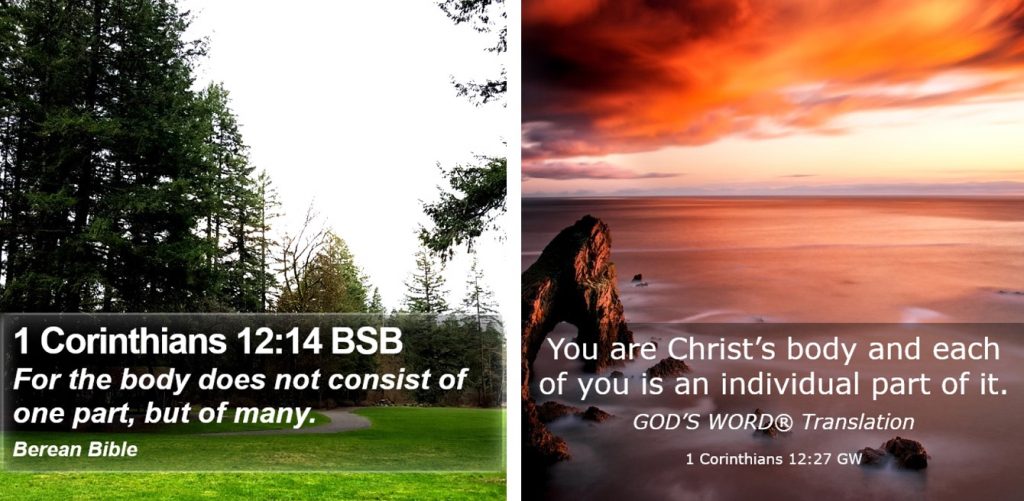“Go therefore and make disciples of all the nations…teaching them to observe all that I commanded you; and lo, I am with you always, even to the end of the age” (Matthew 28:19-20, NASB).
——————–
Contents:
1) Paradoxical Truth (Jerry Fite)
2) Don’t Forget to Say “Thank You” (Bryan Gibson)
3) Sword Tips #59 (Joe R. Price)
——————–

-1-
Paradoxical Truth
Jerry Fite
We all know “less is more,” don’t we? Really? To equate two words that take the mind in two opposite directions is contradictory. How could “less” ever be “more”? The statement might be emphasizing the truth that less complicated things are often appreciated more. “Less is more” is paradoxical. It appears self-contradictory, but when investigated, the statement is understood as well founded, and true. Paradoxical statements are intriguing to the mind, causing one to ask, “how could this be true?”
Paul, inspired by the Holy Spirit, reveals seven paradoxical statements in 2 Corinthians 6:8-10. On the surface, they are contradictory; but their claims reveal truth relating to the life of Paul, and the lives of the apostles of Jesus Christ. Some of these paradoxical truths are: They are “deceivers,” but “true:” are “unknown, but “known;” are “dying,” but “behold, we live.” It is not hard to see how these imposed contradictory statements are true. Paul, and his associates are regarded as “deceivers” by those who do not want to accept the truth of the Gospel. Some men regard them as “deceivers,” but God considers his servants to be “true.” By worldly standards, they are “unknown,” but are “known” to the one who matters: the Lord (cf. 2 Timothy 2:19). Paul and his companions are continually facing the punishment of death, but by the providential deliverance of God, “behold, they live.”
Paul continues his paradoxical truths with, “…as sorrowful, yet always rejoicing” (2 Corinthians 6:10). How can Paul be “always rejoicing,” when he reveals his inward “…great sorrow and unceasing grief in my heart” for his unsaved Jewish brethren in the flesh (Romans 9:2-3)? We look to Paul’s surpassing love for the cause of Christ for our answer. He is lead in triumph in the Lord, even when people reject the Gospel. Paul sees himself as “a fragrance of Christ to God among those who are being saved and among those who are perishing; to the one an aroma from death to death, to the other an aroma from life to life…” (2 Corinthians 2:15-16). Yes, he hurts over his lost brethren, but such sorrow does not squelch his greater satisfaction in being a “fragrance of Christ” in preaching the Gospel to all.
Regardless of grief from painful persecution, the sorrow from the separation of death, or the sadness from confiscation of personal property, the inseparable love of God in Christ and the certain hope of heaven cause one to rejoice in the Lord always (Romans 8:18, 37-39; Heb. 10:34). Sorrowful, yes, because these things hurt us as human beings; but always rejoicing in the Lord.
Paul also speaks of “being poor, yet making many rich” (2 Corinthians 6:10). This paradox is true because spreading the Gospel requires desire in the heart, not money. Paul is not speaking of earthly wealth, for the beggarly poor are engrossed with surviving another day at the hands of the rich, not busy in trying to make others rich. One can be destitute of earthly riches, and make others rich in faith through the Gospel (cf. James 2:5).
The final intriguing paradox is “…as having nothing yet possessing all things” (2 Corinthians 6:10). God is the Creator of all, but has not left created things out of His reach for providential use (Matthew 6:31-33). As Paul earlier wrote, “…all things belong to you, and you belong to Christ; and Christ belongs to God” (I Cor. 3:22-23). Belonging to God, you possess all things!
— Via Glad Tidings, Vol. XXVII, No. 10, March 11, 2018
——————–

-2-
Don’t Forget to Say “Thank You”
Bryan Gibson
One thing’s for sure—when we DO forget, Jesus notices. When Jesus healed ten lepers and only one returned to say, “thank you,” Jesus said, “Were there not ten cleansed… where are the nine?” (Luke 17:17). Could it be Jesus is asking the same about us? Perhaps we haven’t returned to say, “thank you.” Here are some ways we can say “thank you” to Jesus, and to our heavenly Father.
By proper observance of the Lord’s supper. “For as often as you eat this bread and drink this cup, you proclaim the Lord’s death till He comes” (1 Corinthians 11:26). We eat the Lord’s supper every week in remembrance of Jesus (1 Corinthians 11:24-25); and so by properly “discerning the Lord’s body” (1 Corinthians 11:29), we can let Him know how much we appreciate what He did. And if we don’t…we “will be guilty of the body and blood of the Lord” (1 Corinthians 11:27).
In prayer. Thanksgiving should always accompany the requests we make of God (Colossians 4:2; Philippians 4:6). Let’s be sure to give thanks for Jesus—for His life, His death and resurrection, and His present work as our intercessor (Hebrews 7:25). And while we’re thanking Him, let’s also give thanks for the many spiritual blessings that we have through Him (Ephesians 1:3).
In song. “speaking to one another in psalms and hymns and spiritual songs, singing and making melody in your heart to the Lord, giving thanks always for all things to God the Father in the name of our Lord Jesus Christ” (Ephesians 5:18-20; see also Colossians 3:15-17). Many of the songs we sing in worship are designed to give praise to Jesus, to thank Him for His wonderful love. Let’s make sure we honor Him with more than just our lips. Unless we sing from the heart, our worship is vain (Matthew 15:8).
By living for Him. “For the love of Christ compels us, because we judge thus: that if One died for all, then all died; and He died for all, that those who live should live no longer for themselves, but for Him who died for them and rose again” (2 Corinthians 5:14-15). This is the big test, the one that really reveals the depth of our gratitude. We say Jesus means a lot to us, but the best way to prove it is by living for Him—and not just occasionally, but every single day.
By telling others about Him. We think our doctor is really good; we tell others about him. Love the job our mechanic does—same deal, we tell others about him. If we truly love Jesus and the hope we have in Him, it’s awful hard to keep it to ourselves. The early disciples sure couldn’t, because they “went everywhere preaching the word” (Acts 8:4). Paul couldn’t help himself when he appeared before King Agrippa: “I would to God that not only you, but also all who hear me today, might become both almost and altogether such as I am, except for these chains” (Acts 26:29). He was so thankful for what he had in Christ, and he wanted everyone else to have it, too.
“Thanks be to God for His indescribable gift!” (2 Corinthians 9:15).
— Via Plain Words from God’s Word, February 18, 2025
——————–

-3-
“And take…the sword of the Spirit, which is the word of God” (Eph. 6:17).
Sword Tips #59
Joe R. Price
For it is better, if it is the will of God, to suffer for doing good than for doing evil. For Christ also suffered once for sins, the just for the unjust, that He might bring us to God… (1 Peter 3:17-18)
Suffering can occur for different reasons. Peter notes two of those reasons in broad terms, for doing good and for doing evil. The evil doer brings suffering upon himself, the just punishment for transgression. But, to suffer for doing good is more difficult to accept graciously. Yet, the sinless Son of God suffered crucifixion to save us from sin and eternal death.
Use Christ as your example when you are mistreated for doing good things for others. Rejoice that you are sharing in Christ’s sufferings and that you will be blessed by God for following in the steps of Jesus.
——————–
Matthew 5:10
“Blessed are those who have been persecuted for the sake of righteousness, for theirs is the kingdom of heaven” (NASB).
——————–
The Steps That Lead to Eternal Salvation
1) Hear the gospel — for that is how faith comes (Rom. 10:17; John 20:30-31).
2) Believe in the deity of Jesus Christ, the Son of God (John 8:24; John 3:18).
3) Repent of sins. For every accountable person has sinned (Romans 3:23; Romans 3:10), which causes one to be spiritually dead (Ephesians 2:1) and separated from God (Isaiah 59:1-2; Romans 6:23). Therefore, repentance of sin is necessary (Luke 13:5; Acts 17:30). For whether the sin seems great or small, there will still be the same penalty for either (Matt. 12:36-37; 2 Cor. 5:10) — and even for a lie (Rev. 21:8).
4) Confess faith in Christ (Rom. 10:9-10; Acts 8:36-38).
5) Be baptized in water for the remission of sins (Mark 16:16; Acts 2:38; 22:16; 1 Pet. 3:21). This is the final step that puts one into Christ (Gal. 3:26-27). For from that baptism, one is then raised as a new creature (2 Cor. 5:17), having all sins forgiven and beginning a new life as a Christian (Rom. 6:3-4). For the one being baptized does so “through faith in the working of God” (Col. 2:12). In other words, believing that God will keep His word and forgive after one submits to these necessary steps. And now as a Christian, we then need to…
6) Continue in the faith by living for the Lord; for, if not, salvation can be lost (Matt. 24:13; Heb. 10:36-39; Rev. 2:10; 2 Pet. 2:20-22).
——————–
Tebeau Street
CHURCH OF CHRIST
1402 Tebeau Street, Waycross, GA 31501
Sunday: 9 a.m. Bible Classes and 10 a.m. Worship Service
Wednesday (all but the first): 7 p.m. Bible Classes
First Wednesday of the month: 7 p.m. Congregational Song Service (about 45 minutes of singing, followed by a short talk)
evangelist/editor: Tom Edwards (912) 281-9917
Tom@ThomasTEdwards.com
https://thomastedwards.com/go/all.htm (This is a link to the older version of the Gospel Observer website, but with bulletins going back to March 4, 1990.)
















